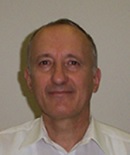
Plenary Lecture
Zero Defect Manufacturing Framework for Machining Defects

Professor Paul Xirouchakis
Advanced Manufacturing Systems
Department of Design, Manufacture and Engineering Management
University of Strathclyde
United Kingdom
E-mail: paul.xirouchakis@epfl.ch
Abstract: A Zero Defect Manufacturing (ZDM) framework for reducing or avoiding workpiece machining defects is presented. At first the ZDM framework is described for the Wire Electrical Discharge Machining (WEDM) process and the following surface defects: surface roughness, recast layer thickness and surface lines. The main ZDM framework components are: (i) an offline process planning system to reduce the average recast layer thickness while maintaining the surface roughness within the desired specification; (ii) an online monitoring and control system to prevent the appearance of surface lines. The components of the offline process planning system are: (i) a Multiple-Input Multiple-Output (MIMO) fuzzy nets system that simultaneously predicts the surface roughness and average recast layer thickness for given input process parameters; (ii) a multi-objective optimization based on the non-dominated sorting genetic algorithm-II (NSGA-II) to select process parameter values for minimizing the average recast layer thickness while respecting the desired surface roughness bound. The components of the online monitoring and control system are: (i) a current signal in the discharge zone monitoring system; (ii) a spark frequency feature extraction component; (iii) an algorithm for real time calculation of the short circuit duration and (iv) a real-time process parameter (pulse-off time) adjustment system. The ZDM framework for WEDM has been implemented and validated in an industry setting. The presentation concludes with a proposal for a generic ZDM architecture for machining defects.
Brief Biography of the Speaker: The focus of Professor Paul Xirouchakis’s research is multidisciplinary at the scientific confluence of design, manufacturing, mechanics, operations research and artificial intelligence:
- Remanufacturing of high value products (molds & dies; oil & gas equipment; diesel engines) using laser metal deposition to reduce lead time, save costs and extend service life
- Laser cutting and repair of CFRP composites based on process development approaches to reduce the heat affected zone and increase productivity
- Zero defect manufacturing using cognitive computation approaches to reduce recast layer thickness and avoid the occurrence of lines & marks in wire Electro-Discharge Machining (EDM) and reduce porosity and micro-cracks in laser metal deposition
- Digital manufacturing for efficient and sustainable milling based on chatter vibrations avoidance to reduce machining time and energy consumption
- Additive manufacturing of aircraft components to realize the Zero Assembly Factory of the Future through component consolidation and topological optimization
- Physics based CAD environment through Medial Axis Transforms to reduce the time to develop a new mechanical product
Professor Paul Xirouchakis was a Professor and Director of the Computer Aided Design and Manufacturing Laboratory at the Swiss Federal Institute of Technology in Lausanne (EPFL) from July 1995 till August 2015. He has 164 international refereed publications and has supervised 21 completed PhD theses. He holds a PhD in Structural Mechanics 1978 from Massachusetts Institute of Technology (MIT), Cambridge, Massachusetts.